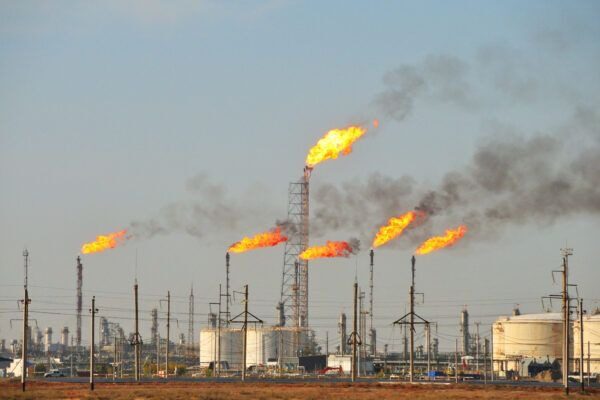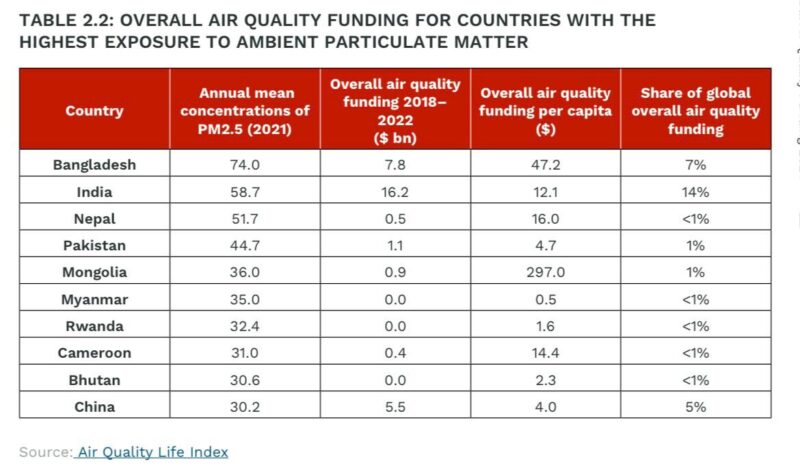A new report from the 2024 State of Global Air Quality has revealed a stark imbalance in international development funding, highlighting a concerning trend: foreign aid for fossil fuel projects quadrupled within a single year while funding for clean air initiatives remains woefully inadequate.
The report shows that global funding for air quality initiatives in 2022 totalled a mere $4.7 billion—just 1% of all international development funds.

This shortfall persists even though air pollution contributes to over 8 million premature deaths annually and incurs economic losses amounting to 6.1% of the global GDP, according to the World Bank. Despite the grave impacts of air pollution, especially in lower-income countries, governments and institutions continue to allocate disproportionate resources to fossil fuel development.
Massive Disparity in Air Quality Funding
The findings underscore that the world's leading economies are pouring money into fossil fuel projects at an alarming rate, despite calls to transition away from polluting energy sources. The report emphasizes that fossil fuel projects saw a fourfold increase in foreign aid in just a year, raising concerns about the global commitment to combating climate change and improving air quality.
In contrast, funding to fight air pollution has stagnated. More than 90% of air quality funding is delivered through loans, further straining the financial capacities of recipient nations. Only 6% comes as grants, a much-needed form of aid that, unlike loans, does not burden countries with repayment obligations. This imbalance is particularly striking when compared to broader international development aid, where 63% of funding is typically provided as grants.

Clean Air a Low Priority Despite Worsening Crisis
What makes the lack of funding for air quality initiatives even more concerning is the growing toll air pollution takes on human life, particularly in lower-income nations. Air pollution, which includes harmful substances like PM2.5—tiny particles that penetrate deep into the lungs—has been linked to severe respiratory issues and other life-threatening conditions. According to the Air Quality Life Index (AQLI) report, particulate pollution is now the world’s greatest external risk to human health, comparable to the impact of smoking.
This invisible killer has slashed global life expectancy by nearly two years, with some regions seeing an even sharper decline. People in the most polluted areas are breathing air that is six times more polluted than those in cleaner regions, cutting their lives short by 2.7 years more on average.
Despite this, countries like Chad and Somalia, where air pollution levels are among the highest in the world, receive only a fraction of the financial support needed to address this crisis. In contrast, countries like the Philippines have secured a larger share of the limited clean air funds available.

The report reveals a troubling disconnect between the severity of air pollution and the global response to it. Less than 3% of public climate finance targets air quality improvement, despite the shared causes between air pollution and climate change. This failure to integrate climate and clean air funding means opportunities to tackle both crises simultaneously are being missed.
Clean Air Fund in Ghana
Clean Air Fund in Ghana
In Ghana, air pollution claimed 28,000 lives in 2019, surpassing deaths from malaria, HIV/AIDS, and tuberculosis combined. Despite this severe impact on public health, one of the biggest challenges in combating air pollution is the lack of local data and research. There remains insufficient research to establish direct links between pollution levels and specific health outcomes, creating a gap in understanding the full extent of the problem. This makes it difficult to craft effective policies and interventions tailored to the Ghanaian context.

Recognising these gaps, the Clean Air Fund in 2022 stepped in to support Ghana’s fight against air pollution. Since then, the Fund has gradually increased its grants to the country, from $0.05 million in 2021 to $1.31 million in 2024—a staggering 2520% increase over four years. Part of this funding has gone into critical initiatives like the Breathe Cities Initiative, which Accra recently joined.
This project, launched by the Clean Air Fund, C40 Cities, and Bloomberg Philanthropies, aims to reduce air pollution and cut carbon emissions by 30%. As part of this effort, 65 low-cost sensors and reference-grade monitors have been installed across the city to provide real-time data on pollution levels, allowing municipalities to better target and combat air pollution.
However, while this growth in funding is significant, it is still far from sufficient given the scale of the problem.

A Call for Integrated Solutions
As the climate crisis intensifies, the report advocates for a more integrated approach to international funding. By aligning air quality initiatives with climate goals, donors could simultaneously reduce pollution and mitigate climate impacts, maximizing the effectiveness of development aid.
However, without a significant shift in funding priorities, the report warns that lower-income countries will continue to face the dual threats of climate change and severe air pollution without adequate support.
The takeaway from the 2024 State of Global Air Quality report is clear: while fossil fuel projects continue to thrive on foreign aid, the world is failing to invest in the clean air solutions needed to protect lives and the environment.

If the trend persists, the global community will not only miss critical opportunities to combat air pollution and save millions of lives, but also fall short in addressing the interconnected challenges of climate change, further jeopardizing the health, well-being, and future of vulnerable populations.

Latest Stories
-
Car ploughs into crowd outside LA nightclub, injuring 30
32 minutes -
GNAT President calls for parliamentary legislation to protect reinstated PTAs
3 hours -
NPP Abanga blames his NDC twin brother for his misfortune
4 hours -
NPP Abanga breaks ranks to shield NDC twin brother in ‘galamsey’ accusations
4 hours -
Saminu Abdul Rasheed smashes national record again with 9.84s sprint in Georgia
5 hours -
Blekusu Coastal project: We’re reclaiming our coastlines – Housing Minister
8 hours -
Pricey plantains push Ghana’s market sellers to diversify
8 hours -
Full list: NPP delegates approve 54 reform motions, reject proposals on youth age, election supervision
8 hours -
WAFCON 2024: Cynthia made it easy – Chantelle hails goalkeeper after penalty saves
8 hours -
Cyber Security Authority boss suspended over use of military bodyguard
9 hours -
WAFCON 2024: I want to make history – Grace Asantewaa dreams of lifting the trophy
9 hours -
Afenyo-Markin accuses NDC of rebranding and claiming credit for NPP projects
9 hours -
2024 WAFCON: Grace Asantewa shines as Black Queens reach semis
9 hours -
WAFCON 2024: Ghana beat Algeria 4-2 on penalties to book semi-final spot for the first time since 2016
9 hours -
NPP Delegates reject motion to shift polling station selection oversight to regional committees
9 hours
